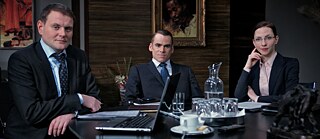Age of Cannibals
A Grotesque of Capitalism

In razor-sharp dialogs, three German business consultants dissect capitalism’s “human resources” in a piece of global intimate theater – and deconstruct themselves in an absurdly comical way in the process.
By Urs Spörri
Niederländer: “If it was anything serious they would have got us out of here long ago.”
Bianca: “Who? The German embassy or what?”
Öllers (sarcastically): “Nah, the Goethe-Institut, Bianca...”
Age of Cannibals has begun: Niederländer and Öllers (they address one other only by surname) have been a team of business consultants for years, working for “the company”. Together, they travel from one crisis-ridden country to the next, streamlining and cashing in on the profits, with scant regard for the (human) consequences. When traveling, they never leave their hotel rooms, which are always identical. When management at the company begins looking for a new partner, they are suddenly forced to compete with one another: Which of them will be promoted? And then they find themselves lumbered with Bianca, an ambitious idealist, who is tasked with writing a report on them. The three must sit back and watch as capitalism itself threatens to gobble them up.
Satirical gem with black humor
In Age of Cannibals, director Johannes Naber has created a gem of satirical excess that seems pretty much unique in contemporary German cinema. Brilliant dialogs penned by screenplay writer Stefan Weigl introduce us with lashings of black humor to a capitalistic world that normally remains hidden to us consumers. In his role as ad writer and creative director, Weigl had formerly spent twelve years studying characters like Niederländer and Öllers – so they are convincingly many-layered in the movies, not mere caricatures. Biting sarcasm immediately annihilates any modicum of sympathy with them: “Capitalism is supposed to save the world?” asks Bianca during an argument with Öllers. “Capitalism is supposed to destroy that world out there!” Öllers replies full of conviction, whereupon Bianca mockingly describes him as a romantic.Throbbing and pulsating
“People are crazy here.” No matter where the trio finds itself, the three business consultants never leave their hotel. Whether they are in India or Nigeria, the backdrop is alarmingly identical. After all, they always stay in the same Chinese hotel chain (one that is entirely fictitious and perfectly designed right down to the tiniest detail), where each room is exactly the same as the next. Niederländer even makes sure that he can pack his suitcase in the shortest possible time no matter where they are, even in the dark, so that he will not have to leave any of his personal belongings behind if they are evacuated. In fact, this most cynical of the three treats everything as if it were a competition: on his home bicycle trainer, Niederländer wears either the polka-dot or yellow jersey of the Tour de France leader, his laptop open in front of him with an idyllic road on its screen. Meanwhile, director Naber makes the view from the window of the hermetically sealed hotel room a conscious departure from reality: outside, all that can be seen are numerous stone steles that have clearly been shaped out of papier mâché; with their different heights and features, they are intended to call to mind the Holocaust memorial in Berlin. What a signal: the German business consultants leave damage in their wake, while outside the same monument to destruction can be seen no matter where they go. The throbbing and pulsating atonal music composed by Cornelius Schwehr further reinforces this sense of being lost and feeling of anxiety – yet of course without ever destroying the finely-balanced black humor of this business grotesque.Outstanding theatrical ensemble
Age of Cannibals presents three control freaks who lose control in a way that is celebrated down to the last detail. This is of course thanks first and foremost to the outstanding theatrical ensemble surrounding Devid Striesow (Öllers), Sebastian Blomberg (Niederländer) and Katharina Schüttler (Bianca), who in this piece of intimate theater walk with extraordinary precision along the narrow line between the relentless capitalists on the fringes of their personal needs and ideals. Striesow for instance, who already played a similar character in Christian Petzold’s YELLA, presents the audience with a superlative piece of acting in the grand finale. Johannes Naber’s stage direction reads as follows: “You have crashed into a tree at 50 mph, you get out of the car and think you have survived unscathed. Then people come along and talk to you about the accident – and you suddenly realize that your bodily functions have stopped working.” In Age of Cannibals, Öllers has mentally crashed into this tree. As has the entire world of capitalism with him.An absurd movie is the only possible response to this absurd condition [of unfettered capitalism].
Johannes Naber, Director of Age of Cannibals
Author

Urs Spörri is a Cultural Manager at the Deutsches Filminstitut. An expert in contemporary German cinema, he chairs events such as the Filmfest München and the Max Ophüls Preis Film Festival in Saarbrücken, and tours the world giving a lecture entitled “Donald Trump, the Actor” about the US president’s 25 film and TV series appearances. Spörri also works as an expert in German Film and Media Evaluation and as a columnist for kino-zeit.de.